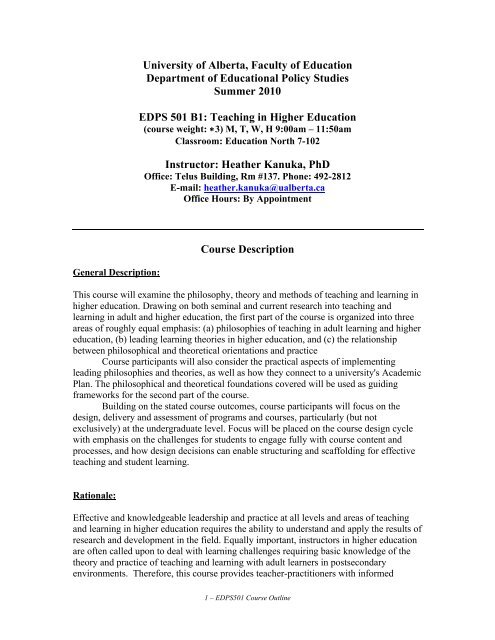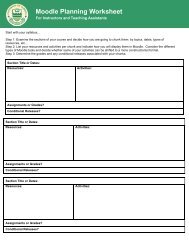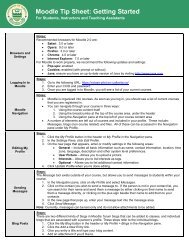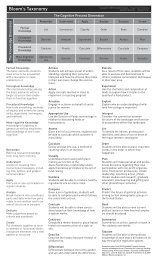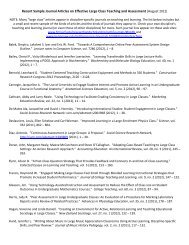Course outline example, EDPS 501 - Centre for Teaching and ...
Course outline example, EDPS 501 - Centre for Teaching and ...
Course outline example, EDPS 501 - Centre for Teaching and ...
Create successful ePaper yourself
Turn your PDF publications into a flip-book with our unique Google optimized e-Paper software.
General Description:<br />
University of Alberta, Faculty of Education<br />
Department of Educational Policy Studies<br />
Summer 2010<br />
<strong>EDPS</strong> <strong>501</strong> B1: <strong>Teaching</strong> in Higher Education<br />
(course weight: ∗3) M, T, W, H 9:00am – 11:50am<br />
Classroom: Education North 7-102<br />
Instructor: Heather Kanuka, PhD<br />
Office: Telus Building, Rm #137. Phone: 492-2812<br />
E-mail: heather.kanuka@ualberta.ca<br />
Office Hours: By Appointment<br />
<strong>Course</strong> Description<br />
This course will examine the philosophy, theory <strong>and</strong> methods of teaching <strong>and</strong> learning in<br />
higher education. Drawing on both seminal <strong>and</strong> current research into teaching <strong>and</strong><br />
learning in adult <strong>and</strong> higher education, the first part of the course is organized into three<br />
areas of roughly equal emphasis: (a) philosophies of teaching in adult learning <strong>and</strong> higher<br />
education, (b) leading learning theories in higher education, <strong>and</strong> (c) the relationship<br />
between philosophical <strong>and</strong> theoretical orientations <strong>and</strong> practice<br />
<strong>Course</strong> participants will also consider the practical aspects of implementing<br />
leading philosophies <strong>and</strong> theories, as well as how they connect to a university's Academic<br />
Plan. The philosophical <strong>and</strong> theoretical foundations covered will be used as guiding<br />
frameworks <strong>for</strong> the second part of the course.<br />
Building on the stated course outcomes, course participants will focus on the<br />
design, delivery <strong>and</strong> assessment of programs <strong>and</strong> courses, particularly (but not<br />
exclusively) at the undergraduate level. Focus will be placed on the course design cycle<br />
with emphasis on the challenges <strong>for</strong> students to engage fully with course content <strong>and</strong><br />
processes, <strong>and</strong> how design decisions can enable structuring <strong>and</strong> scaffolding <strong>for</strong> effective<br />
teaching <strong>and</strong> student learning.<br />
Rationale:<br />
Effective <strong>and</strong> knowledgeable leadership <strong>and</strong> practice at all levels <strong>and</strong> areas of teaching<br />
<strong>and</strong> learning in higher education requires the ability to underst<strong>and</strong> <strong>and</strong> apply the results of<br />
research <strong>and</strong> development in the field. Equally important, instructors in higher education<br />
are often called upon to deal with learning challenges requiring basic knowledge of the<br />
theory <strong>and</strong> practice of teaching <strong>and</strong> learning with adult learners in postsecondary<br />
environments. There<strong>for</strong>e, this course provides teacher-practitioners with in<strong>for</strong>med<br />
1 – <strong>EDPS</strong><strong>501</strong> <strong>Course</strong> Outline
<strong>EDPS</strong> <strong>501</strong> LEC X5: <strong>Teaching</strong> in Higher Education Instructor: Heather Kanuka 2<br />
underst<strong>and</strong>ings of the conceptual issues relating to the philosophies, theories <strong>and</strong> methods<br />
in adult <strong>and</strong> higher education, as well as practical issues involved in teaching within the<br />
postsecondary sector.<br />
Drawing on the theories, philosophies <strong>and</strong> methods in adult <strong>and</strong> higher education<br />
covered in the first section of this course, participants will develop an awareness of the<br />
underpinning practical considerations, <strong>and</strong> associated implications <strong>for</strong> curriculum<br />
development. Additionally, participants will apply their knowledge <strong>and</strong> underst<strong>and</strong>ing by<br />
working on the development <strong>and</strong> delivery of a particular course. Participants will also be<br />
encouraged to exp<strong>and</strong> their repertoire of strategies <strong>and</strong> practical approaches to teaching<br />
by moving outside their familiar frameworks <strong>and</strong> engaging in investigations <strong>and</strong><br />
discussions across disciplinary boundaries.<br />
<strong>Course</strong> Conspectus:<br />
1. To provide knowledge, skills <strong>and</strong> attitudes related to teaching <strong>and</strong> learning in higher<br />
education through a focus on philosophies <strong>and</strong> theories used in evidence-based active<br />
application within the postsecondary sector. The first half of the course is geared toward<br />
broadening the course participants’ underst<strong>and</strong>ings of learning approaches in ways that<br />
can be explored through diverse ways of teaching.<br />
2. To introduce the instructional design cycle <strong>for</strong> course development or redevelopment.<br />
The general purpose of instructional design is to develop, or redevelop, learning<br />
experiences <strong>and</strong> environments that promote the acquisition or enhancement of<br />
knowledge, skills <strong>and</strong> attitudes. This is achieved through carefully planned interactions<br />
between the instructor, learners, materials, instructional activities <strong>and</strong> per<strong>for</strong>mance<br />
environments bringing about the desired student learning outcomes. In terms of the<br />
student assessment in the design cycle, the contrasting <strong>and</strong> often competing goals <strong>and</strong><br />
functions, <strong>and</strong> the available empirical evidence will be covered in this course by means of<br />
three illustrative themes: (1) alignment of instructional methods/strategies of assessment<br />
<strong>and</strong> intended learning outcomes, (2) the growing evidence on the benefits of <strong>for</strong>mative or<br />
learning oriented assessment <strong>and</strong> the impact of developments in assessment practices, <strong>and</strong><br />
(3) learner evaluation strategies.<br />
<strong>Course</strong> Outcomes:<br />
• Assess <strong>and</strong> reflect on personal educational philosophies relevant to higher<br />
education.<br />
• Develop a personal teaching philosophy statement.<br />
• Determine the appropriate learning theory(ies) to match a personal<br />
philosophy<br />
• Design <strong>and</strong> develop a course plan that is aligned with personal philosophies<br />
<strong>and</strong> theories that links: learning outcomes, teaching strategies, <strong>and</strong><br />
assessment/evaluation
<strong>EDPS</strong> <strong>501</strong> LEC X5: <strong>Teaching</strong> in Higher Education Instructor: Heather Kanuka 3<br />
Reading Material<br />
Text: Required<br />
Pregent, R. (1994). Charting your course: How to prepare <strong>and</strong> teach more effectively.<br />
Montreal: Magna Publications, Inc.<br />
Text: Recommended<br />
Kuh, G., Kinzie, J., Schuh, H. H. Whitt, E., & Associates. (2005). Student Success in<br />
College: Creating Conditions that Matter. Jossey-Bass.<br />
Journal Articles: Recommended<br />
Philosophy<br />
Barnett, R. (2005). Recapturing the universal in university. Educational Philosophy <strong>and</strong><br />
Theory, 37(6), 785-797.<br />
Barnett, R. (2000). Thinking the university, again. Educational Philosophy <strong>and</strong> Theory,<br />
32(3), 319-326.<br />
Barnett, R. (1993). The idea of academic administration. Journal of Philosophy of<br />
Education, 27(2), 179-192.<br />
Barnett, R. (1988). Does higher education have aims? Journal of Philosophy of<br />
Education, 22(2), 239-250.<br />
Kanuka, H. (2008). Underst<strong>and</strong>ing e-Learning Technologies-in-Practice through<br />
Philosophies-in-Practice. In T. Anderson & F. Elloumi (Eds.), Theory <strong>and</strong> Practice<br />
of Online Learning, (pp. 91-118). Edmonton, AB: Athabasca University Press.<br />
Kanuka, H. & Anderson, T. (1999). Using constructivism in mediated learning:<br />
Constructing order out of the chaos in the literature. Radical Pedagogy, 1(2).<br />
[online]. Available: http://www.icaap.org/RadicalPedagogy/<br />
Toohey, S. (1999). Beliefs, values <strong>and</strong> ideologies in course design. In Designing courses<br />
<strong>for</strong> higher education (pp. 44-70). Buckingham: SRHE <strong>and</strong> Open University Press.<br />
Zinn, L. M. (1991). Identifying your philosophical orientation. In M. Galbraith (Ed.).<br />
Adult Learning Methods. Malabar, FL: Krieger Publishing Company.<br />
Content<br />
Jonassen, D., Beissner,K., & Yacci, M. (1993). Explicit methods <strong>for</strong> conveying concept<br />
maps. In Structural knowledge: Techniques <strong>for</strong> representing, conveying, <strong>and</strong><br />
acquiring structural knowledge (pp. 155-163). Hillsdale, NJ: Erlbaum.<br />
Donald, J. G. (1983). Knowledge structures: Methods of exploring course content.<br />
Journal of Higher Education, 54(1), 31-41.<br />
Outcome<br />
LaSaere Ericson, B., & Weltner Strommer, D. (1991). Knowing, underst<strong>and</strong>ing <strong>and</strong><br />
thinking: The goals of freshman instruction. In <strong>Teaching</strong> college freshmen (pp. 65-<br />
80). San Francisco: Jossey-Bass.<br />
Shulman, L. S. (1999). Taking learning seriously. Change, 31(4), 11-17.
<strong>EDPS</strong> <strong>501</strong> LEC X5: <strong>Teaching</strong> in Higher Education Instructor: Heather Kanuka 4<br />
Entwistle, N. (1998). Approaches to learning <strong>and</strong> <strong>for</strong>ms of underst<strong>and</strong>ing. In B. Dart &<br />
Boulton-Lewis (Eds.), <strong>Teaching</strong> <strong>and</strong> learning in higher education (pp. 72-101).<br />
Melbourne: ACER<br />
Strategy<br />
McAlpine, L. (2004). Designing learning as well as teaching. Active Learning in Higher<br />
Education, 5(2), 119-134.<br />
Weimer, M. (2003). Focus on learning, trans<strong>for</strong>m teaching. Change, 35(5), 49-54.<br />
Angelo, T. A. (1993). A teacher’s dozen: Fourteen general, research-based principles <strong>for</strong><br />
improving higher learning in our classrooms. AAHE Bulletin, 45(8), 3-13.<br />
Kanuka, H., Rourke, L., & Laflamme, E. (2007). The influence of instructional methods<br />
on the quality of online discussion. British Journal of Educational Technology,<br />
38(2), 260-271.<br />
Assessment<br />
Ramsden, P. (1992). Assessing <strong>for</strong> underst<strong>and</strong>ing. In Learning to teach in higher<br />
education (pp. 181-213). New York: Routledge.<br />
Angelo, T. A., & Cross, K. P. (1993). What is classroom assessment? In Classroom<br />
assessment techniques: A h<strong>and</strong>book <strong>for</strong> college teachers (pp. 3-11). San Francisco:<br />
Jossey-Bass.<br />
Grading in General:<br />
Evaluation<br />
Grades will reflect the degree to which written <strong>and</strong> in-class activities exemplify work that<br />
is organized, rigorous, <strong>and</strong> critically analytical. <strong>Course</strong> products must also demonstrate an<br />
ability to integrate theory <strong>and</strong> practice.<br />
Written assignments must use APA (American Psychological Association) style.<br />
It is important to reference sources accurately. The ef<strong>for</strong>t to use an appropriate academic<br />
style helps structure <strong>and</strong> present academic work in a clear <strong>and</strong> accurate manner.<br />
Moreover, it respectfully acknowledges the contributions of author-researchers whom<br />
you have used to strengthen your presentation <strong>and</strong> arguments.<br />
You can access in<strong>for</strong>mation about the APA Style Manual <strong>and</strong> associated guides<br />
by using this WEB site: http://www.apastyle.org/<br />
Evaluation Criteria:<br />
<strong>Course</strong> participants will have the opportunity to demonstrate their underst<strong>and</strong>ings of<br />
philosophies, theories <strong>and</strong> practices of adult learning in higher education through the<br />
following activities:<br />
1. Working philosophy statements (20 points)<br />
This assignment will require two philosophical working statements that are<br />
discipline-related, outlining personal assumptions on the role of student, learning,<br />
teaching, <strong>and</strong> relationship to a University Academic Plan.
<strong>EDPS</strong> <strong>501</strong> LEC X5: <strong>Teaching</strong> in Higher Education Instructor: Heather Kanuka 5<br />
Version 1: 5 points – Due July 28, 2010<br />
Version 2: 15 points – Due Aug 2, 2010<br />
2. Group presentation (25 points) – Aug 9-10, 2010<br />
Working in small groups on a selected topic (disciplinary relevant but of interest<br />
<strong>and</strong> underst<strong>and</strong>able to a diverse audience), participants will facilitate a learning<br />
event using an instructional strategy consistent with their personal teaching<br />
philosophy <strong>and</strong> appropriately aligned with an articulated learning theory.<br />
<strong>Course</strong> participants will also have the opportunity to demonstrate their underst<strong>and</strong>ings of<br />
design <strong>and</strong> development of learning, teaching <strong>and</strong> assessment in higher education through<br />
the following activities:<br />
3. Development of a course plan (20 points) – Due Aug 5, 2010<br />
Using an existing or a new course, participants will develop a course plan within<br />
their program (context). The course plan will include: course content, course<br />
goals, learning objectives, learning outcomes, instructional strategies, <strong>and</strong><br />
assessment/student evaluation.<br />
4. <strong>Teaching</strong> dossier/portfolio (35 points) – Due Aug 11, 2010<br />
Using the products developed throughout the course, create a teaching dossier<br />
Late assignments will have 5% deducted <strong>for</strong> each overdue day.<br />
The four point letter grading system will be used (GFC 61.1) <strong>for</strong> graduate<br />
student courses.<br />
The course assignment points will be applied to the 4-point letter grading system,<br />
mindful of the University’s guiding distribution with approximately 40% of grades<br />
falling in the A (Excellent) range, about 33% of grades fall in the B+/B (Good) range,<br />
<strong>and</strong> about 20% falling in the B-/C (Satisfactory) range. B+ is the expected class<br />
median grade.<br />
Grade Descriptors<br />
A range: Excellent. superior work in all respects including technical quality; meets all<br />
criteria consistently<br />
B+, B range: Good. some above-average work; meets most criteria consistently;<br />
minimal technical problems<br />
B-, C+ range: Satisfactory. competent but inconsistent work; meets some criteria;<br />
some technical errors or problems<br />
C, F range: Failure. inadequate work; does not meet criteria; many technical errors or<br />
problems<br />
Grades will be set based on a combination of<br />
absolute <strong>and</strong> distribution.
<strong>EDPS</strong> <strong>501</strong> LEC X5: <strong>Teaching</strong> in Higher Education Instructor: Heather Kanuka 6<br />
The Faculty of Education is committed to providing an environment of equality <strong>and</strong><br />
respect <strong>for</strong> all people within the University community, <strong>and</strong> to educating faculty, staff<br />
<strong>and</strong> students in developing teaching <strong>and</strong> learning context that are welcoming to all.<br />
Policy about course <strong>outline</strong>s can be found in Section 23.4(2) of the University Calendar.<br />
The University of Alberta is committed to the highest st<strong>and</strong>ards of academic integrity <strong>and</strong><br />
honesty. Students are expected to be familiar with these st<strong>and</strong>ards regarding academic<br />
honesty <strong>and</strong> to uphold the policies of the Univeristy in this respect. Students are<br />
particularly urged to familiarize themselves with the provisions of the Code of Student<br />
Behaviour (on line at www.ualberta.ca/secretariate/appeals.htm) <strong>and</strong> avoid any behaviour<br />
which could potentially result in suspicions of cheating, plagiarism, misrepresentation of<br />
facts <strong>and</strong>/or paritcipation in an offence. Academic dishonest is a serious offence <strong>and</strong> can<br />
result in suspension or expulsion from the University. (GFC 29 SEP 2003)


